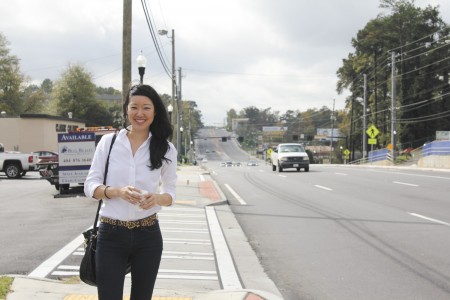
to me because it’s my future.” – Marian Liou,
We Love BuHi founder
We Love BuHi began this year as Brookhaven resident Marian Liou’s Instagram account, a photo album of her Buford Highway neighborhood. Now it’s her business, selling T-shirts, staging bike rides and advocating for immigrant communities to have a say on the rapidly changing corridor.
“My mission really is encouraging the revitalization of Buford Highway…[but] in a way, reflective of diversity and that involves the community,” said Liou during a recent lunch at Havana Sandwich Shop in Brookhaven’s section of the road.
“This cultural diversity is a huge asset we need to protect and promote,” she said. Otherwise, “the forces of gentrification could happen because this area is so convenient and affordable right now.”
The 36-year-old attorney is taking a break from practicing law to focus on We Love BuHi. She calls it a “social enterprise”— a for-profit business, but with a socially conscious mission.
Its biggest event so far was Buford Highway Bikes and Bites in September, which drew 75 people pedaling 4.5 miles of the street and stopping at local restaurants.
Brookhaven City Councilman Bates Mattison joined the Bikes and Bites tour. He praised We Love BuHi for highlighting local businesses and creating opportunities for collaboration—including when he found himself biking alongside a Chamblee city councilman.
“Buford Highway is an absolute treasure for all three of our cities,” Mattison said. “I applaud her efforts because she’s a champion for a treasure for our community.”
Liou said she enjoys exploring the hundreds of Buford Highway businesses, but We Love BuHi has some personal motivations as well.
As a second-generation Chinese American from California, Liou said she recently reconnected with her cultural heritage and wonders about passing it on to her two children. She’s now a board member of Norcross-based Asian Americans Advancing Justice Atlanta, which works with Buford’s immigrant communities.
“The future of Buford Highway is important to me because it’s my future,” Liou said.
Another spark for Liou’s interest was curiosity about urban planning and the impact of pending redevelopments, such as Doraville’s former GM plant and the Peachtree Creek Greenway park.
“All of this came from a question of mine. Why are there [streetscape] improvements in some areas of Buford Highway and not others?” Liou said.
She didn’t realize the road runs through several jurisdictions between Buckhead and I-285 and is a state route.
Recalling her reaction to the GM plant redevelopment plans, she said, “Wow, they’re going to plop down Atlantic Station in Doraville. That’s going to impact everything.”
She worries about local, independent businesses competing with national chains.
With Liou’s concern about gentrification, why the use of “BuHi,” the “SoHo”-style abbreviation developers and brokers often use in gentrifying areas? “It’s a signifier. It means the end is near,” Liou said in joking agreement about such abbreviations.
While she’s “not a huge fan” of the “BuHi” abbreviation herself, she said, it’s easier to use on social media.
In recent months, she has launched welovebuhi.com and started selling T-shirts with the slogan. She’s working on a small-scale international film festival to be held in local restaurants, and a second Bikes and Bites is the works for February. Her latest project is developing a digital map of local businesses that also could be used as physical wayfinding signs on the street.
On the organizing end, Liou shows up at meetings ranging from the Cross Keys school cluster to the Greenway park, advocating for better local engagement—including in languages other than English—and bigger-picture planning.
She notes, for example, that Brookhaven has an economic development plan for its piece of the corridor—which it would rebrand “Buford Boulevard”—but other cities don’t. She’d like to see the Atlanta Regional Commission create a Livable Centers Initiative study for Buford.
Liou said she’s giving We Love BuHi six months to see if it’s viable. (Her work recently got her a part-time event planner job with the city of Doraville, too.) But either way, she said, change is coming to Buford.
“It’s not good or bad,” she said. “It’s what kind of change do you want to see?”
